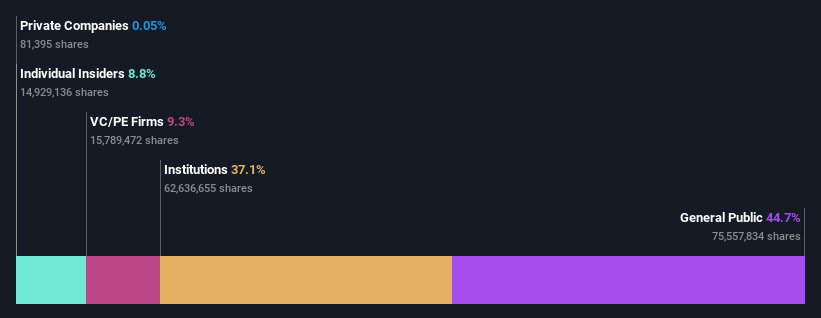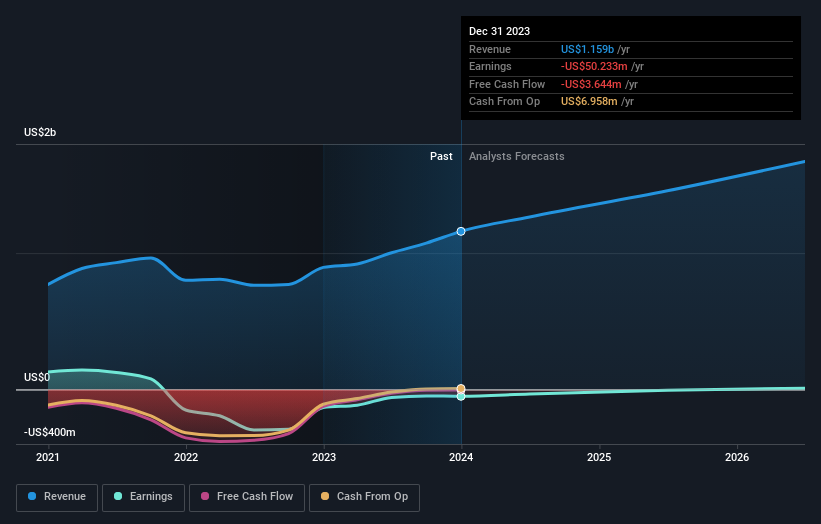Institutions own 37% of SelectQuote, Inc. (NYSE:SLQT) shares but individual investors control 45% of the company
Key Insights
Significant control over SelectQuote by individual investors implies that the general public has more power to influence management and governance-related decisions
A total of 25 investors have a majority stake in the company with 47% ownership
Every investor in SelectQuote, Inc. (NYSE:SLQT) should be aware of the most powerful shareholder groups. And the group that holds the biggest piece of the pie are individual investors with 45% ownership. Put another way, the group faces the maximum upside potential (or downside risk).
Meanwhile, institutions make up 37% of the company’s shareholders. Institutions often own shares in more established companies, while it's not unusual to see insiders own a fair bit of smaller companies.
Let's take a closer look to see what the different types of shareholders can tell us about SelectQuote.
View our latest analysis for SelectQuote
What Does The Institutional Ownership Tell Us About SelectQuote?
Institutional investors commonly compare their own returns to the returns of a commonly followed index. So they generally do consider buying larger companies that are included in the relevant benchmark index.
SelectQuote already has institutions on the share registry. Indeed, they own a respectable stake in the company. This suggests some credibility amongst professional investors. But we can't rely on that fact alone since institutions make bad investments sometimes, just like everyone does. If multiple institutions change their view on a stock at the same time, you could see the share price drop fast. It's therefore worth looking at SelectQuote's earnings history below. Of course, the future is what really matters.
SelectQuote is not owned by hedge funds. Our data shows that Brookside Equity Partners LLC is the largest shareholder with 9.3% of shares outstanding. Meanwhile, the second and third largest shareholders, hold 6.2% and 4.7%, of the shares outstanding, respectively. Additionally, the company's CEO Timothy Danker directly holds 1.1% of the total shares outstanding.
Our studies suggest that the top 25 shareholders collectively control less than half of the company's shares, meaning that the company's shares are widely disseminated and there is no dominant shareholder.
Researching institutional ownership is a good way to gauge and filter a stock's expected performance. The same can be achieved by studying analyst sentiments. There is some analyst coverage of the stock, but it could still become more well known, with time.
Insider Ownership Of SelectQuote
The definition of an insider can differ slightly between different countries, but members of the board of directors always count. Management ultimately answers to the board. However, it is not uncommon for managers to be executive board members, especially if they are a founder or the CEO.
I generally consider insider ownership to be a good thing. However, on some occasions it makes it more difficult for other shareholders to hold the board accountable for decisions.
We can see that insiders own shares in SelectQuote, Inc.. In their own names, insiders own US$25m worth of stock in the US$286m company. This shows at least some alignment. You can click here to see if those insiders have been buying or selling.
General Public Ownership
The general public-- including retail investors -- own 45% stake in the company, and hence can't easily be ignored. This size of ownership, while considerable, may not be enough to change company policy if the decision is not in sync with other large shareholders.
Private Equity Ownership
Private equity firms hold a 9.3% stake in SelectQuote. This suggests they can be influential in key policy decisions. Some investors might be encouraged by this, since private equity are sometimes able to encourage strategies that help the market see the value in the company. Alternatively, those holders might be exiting the investment after taking it public.
Next Steps:
While it is well worth considering the different groups that own a company, there are other factors that are even more important. For instance, we've identified 2 warning signs for SelectQuote (1 can't be ignored) that you should be aware of.
Ultimately the future is most important. You can access this free report on analyst forecasts for the company.
NB: Figures in this article are calculated using data from the last twelve months, which refer to the 12-month period ending on the last date of the month the financial statement is dated. This may not be consistent with full year annual report figures.
Have feedback on this article? Concerned about the content? Get in touch with us directly. Alternatively, email editorial-team (at) simplywallst.com.
This article by Simply Wall St is general in nature. We provide commentary based on historical data and analyst forecasts only using an unbiased methodology and our articles are not intended to be financial advice. It does not constitute a recommendation to buy or sell any stock, and does not take account of your objectives, or your financial situation. We aim to bring you long-term focused analysis driven by fundamental data. Note that our analysis may not factor in the latest price-sensitive company announcements or qualitative material. Simply Wall St has no position in any stocks mentioned.


